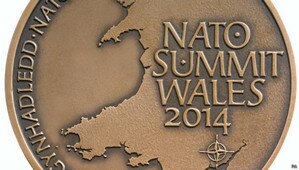
The Independent Analytical Center for Geopolitical Studies “Borysfen Intel” affords ground to the analysts generation for expressing their point of view regarding the political, economic, security, information situation in Ukraine and in the world in general, according to their personal geopolitical studies and analyses.
Note that an authors’ point of view
|
Oleksiy Volovych
Frankly speaking, I have never been an ardent supporter of NATO. And not because first the communist, and now the Russian propagandas have been relentlessly frightening ordinary people with this organization for the past 65 years of its existence. For example, I cannot accept what the NATO countries have done in Serbia, Iraq and Libya, where I once had to serve as a military interpreter and UN's observer[1]... By the way, while still a senator from Illinois, Barack Obama had been consistently opposing the war in Iraq, criticizing the administration of George Bush Junior for his adventurism...[2]
Like any organization that unites a lot of people and countries, NATO has its strengths and weaknesses, positive and negative features. But most importantly — what trends in the development of the Alliance prevail, and whether it is able to develop, at the same time correcting its mistakes and getting rid of drawbacks? In my opinion, NATO mainly demonstrates the ability to self-improvement, as its activity is based on democratic values of its member- countries: respect for international Law and principles of the United Nations, ensuring the peaceful coexistence of states, as well as mutual aid, security, resolution of conflicts by peaceful means, protection of personal freedom of every citizen.
Today the whole world is watching how the Ukrainian people, shedding blood, is fighting for its freedom and dignity, for its place in the family of European nations. Today, Ukraine at the expense of lives and injuries of thousands of its best sons is defending not only itself, but also the whole Europe from the invasion from the East. Realizing the reality of the overwhelming advantages of Russian military power over the Ukrainian one, our people understands that it is able to defend the sovereignty and territorial integrity of Ukraine only with the support of the international community. And first of all — with the support of the most powerful military alliance in the world — the North Atlantic Alliance, which today unites 28 member-states and 30 partner- countries.
Multi-faceted and broad co-operation between Ukraine and NATO has a long history. In March 1992, Ukraine became a member of the Euro-Atlantic Partnership Council (EAPC). Since 1994, our state has been actively involved in the program “Partnership for Peace” (PFP). 9 July 1997, in Madrid was signed the Charter on a Distinctive Partnership between NATO and Ukraine, according to which since April 1999, the format of relations was transformed into a common forum-commission “Ukraine-NATO” (CUN). In February 2005, at the CUN's summit in Brussels, Ukraine declared giving it NATO membership as the ultimate goal of its cooperation with the Alliance. This Ukraine's signal was received in Brussels positively.
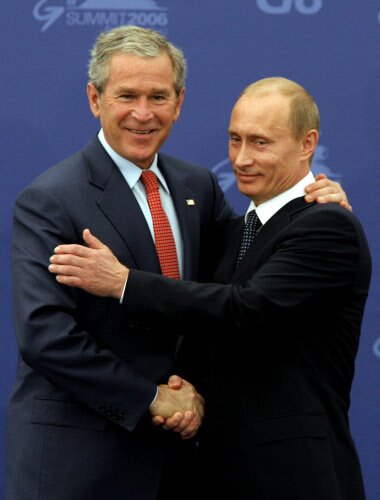 |
|
“You know, George that Ukraine is not even a state!”» http://atnews.org/ |
April 3, 2008, in Bucharest, was held a meeting of the North Atlantic Council of NATO at the level of Heads of states and governments, which resulted in adoption of the Declaration of the Bucharest summit, where, in particular, was pointed out that “NATO welcomes Ukraine's Euro-Atlantic aspirations concerning NATO membership”. However, this declaration, unfortunately, the Alliance did not support by concrete actions. Because of Russia and some NATO members' (Germany, France and Italy to be exact) disagreement, at the summit Ukraine was not included into the Action Plan for NATO membership (MAP). If, then, it had been included, Ukraine most possibly would already be a member of NATO, and Russia would not dare to use aggression against it. It was on the sidelines of that NATO summit that Putin said to President George. W. Bush, “You know, George, that Ukraine – it is not even a state! What is Ukraine? Part of its territory is Eastern Europe, while the other part – and a large part at that – was presented to it by us!”
Unfortunately, the very conniving to Putin's anti-Ukrainian encroachments on the part of Western leaders, led to the annexation of the Crimea and the Kremlin's attempts to capture the South-East of Ukraine in order to reanimate the so-called “Novorossiya” (“New Russia”).
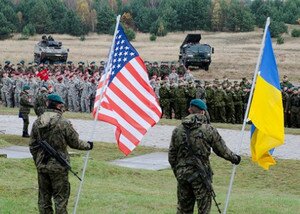 |
|
For more than 20 years of cooperation between Ukraine and NATO have been carried out tens of joint military trainings http://news.bigmir.net/ |
During the more than 20 years of cooperation between Ukraine and NATO, have been carried out several tens of joint military trainings, a wide variety of programs has been implemented, thousands of Ukrainian military servicemen have been trained at courses at various military educational institutions in the NATO countries). Regularly work joint working groups on military reforms, weapons, economic security, planning for emergencies and the like. However, we must admit that this work was quite formal, superficial and, as a result, did not lead to a radical restructuring and modernization of the Armed Forces of Ukraine, where the destructive processes had been constantly intensified, especially in the time of the last two Ministers of Defense of Ukraine D. Salamatin and P. Lebedev, who, honestly speaking, turned out to be the Kremlin's agents.
Since the annexation of the Crimea, NATO Secretary General Anders Fogh Rasmussen and other leaders of the North Atlantic Alliance have repeatedly condemned Russia's aggressive actions against Ukraine and expressed their support for the sovereignty, independence and territorial integrity of our country, pointing out that it has all the chances and will be given a membership in NATO in the nearest future. At the same time, NATO has stopped all kinds of cooperation with the Russians, and supported the EU's sanctions against Russia. In early April 2014, at the meeting of the Commission, “Ukraine-NATO” at the level of Ministers of Foreign Affairs it was agreed on implementation of the Programme of Immediate and long-term measures aimed at strengthening the capacity of Ukraine to ensure its security.
The NATO summit in Wales
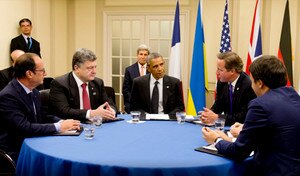 |
|
Ukrainian President Petro Poroshenko on NATO summit |
Ukraine hopes were pinned to the NATO summit in South Wales (Newport) September 4- 5 this year, for which President of Ukraine P. Poroshenko was invited. On the first day of the summit Poroshenko met with leaders of the five major Western countries — the USA, UK, Germany, France and Italy, and also participated in the meeting of “NATO-Ukraine” Commission at the highest level, which was unprecedented in the history of the Alliance' summits. In our opinion, the information that on 5 September, Ukraine could agree with the separatists on the ceasefire, not so much helped as did Poroshenko an ill service, because many participants of the summit decided to just discuss this news with zeal and thoroughness, but not to speak of any real help to Ukraine in defending its sovereignty from the Russian (open or ill-concealed) aggression.
One gets the impression that on the eve of the NATO summit Putin deliberately went to a temporary truce in the Donbas, to minimize the negative consequences of this summit for himself. It should be noted that in a certain way, he managed to achieve this. In general, it seems that the leaders of a number of European countries are willing to accept any peace agreement between Kiev and Moscow, even at the expense of the national interests of Ukraine, just to get rid of the “headache” — a dangerous confrontation with Russia. But it is a very short-sighted policy. It will cause, at least, a lot of harm to Europe if Putin manages to revive the Russian empire at the expense of the absorption of Ukraine. The question arises: how many Ukrainians still have to lay down their heads and how many Ukrainian territories have to be grabbed by Russian troops, terrorists and separatists to make Europe at last realize that the Ukrainians today are defending not only Ukraine, but also the whole Europe?
President P. Poroshenko's super-task was to achieve an agreement on providing Ukraine with defensive weapons, in particular, high-precision weapons, especially as the Presidents of Romania and Lithuania called on the Alliance for this. As you know, September 4, at the end of the first day of the summit, P. Poroshenko while communicating with the media said that he allegedly managed to reach an agreement on a bilateral level with individual NATO members on military and technical cooperation, including supplies to Ukraine of lethal and non-lethal weapons, precision weapons, included. However, apart from P. Poroshenko, during the two days of the summit no leader of a state or other official mentioned such an agreement. Even two days after the summit, officials from Italy, Poland and Norway denied allegations about such arrangements.
On the other hand, supplies of weapons to countries where combat actions are taking place are never publicized, so we cannot exclude that the agreements with some countries to provide Ukraine with weapons were really achieved, but our partners probably prefer not to talk about this to the general public. However, a small Croatia, which became a member of NATO in 2009, has already promised to give Ukraine14 Mi-8MTВ-1 helicopters. But the United States, supplying its attack helicopters AH-64D Apache and other weapons to many countries, is not hurrying to give them to Ukraine.
Polish President B. Komorowski, who on the first day of the summit had a separate meeting with President of Ukraine P. Poroshenko, said that Poland would give weapons to Ukraine if P. Poroshenko asked for it. But so far he has not done so. Here it should be pointed out that at warehouses and munitions factories in Ukraine there are more than enough heavy weapons. So why is there still not enough of it at the front?..
In general, the military-industrial complex (MIC) of Ukraine is capable of producing armaments and military equipment, not inferior in quality to the best world samples. But the Ukrainian military-industrial complex has worked mainly for the external market, and not for the benefit of strengthening the Armed Forces of Ukraine. Over time, we could establish our own mass production of weapons and military equipment and by 90% to meet the needs of our Army. So today, we are more in need of temporary financial support for the organization of mass military production.
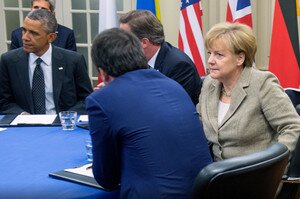 |
|
German Chancellor A. Merkel is against supplying Ukraine with arms http://obozrevatel.com/ |
Germany's Chancellor A. Merkel opposes arms supplies to Ukraine, arguing that she does not believe in the possibility of solving the “Ukrainian conflict” by military means. Probably, Frau Merkel believes in solution by military means of the Kurdish conflict in northern Iraq, as her government decided by the end of September to send to Kurdish soldiers weapons and equipment worth 70 million Euros. Besides, Germany will provide the Iraqi Kurds with another 50 million Euros of humanitarian aid. The official Berlin explains this aid by the terrorist threat to Europe from the militants of the “Islamic state”. Probably, Frau Merkel considers Russian terrorists and militants from DPR and LPR not too dangerous for Europe.
At P. Poroshenko's meeting with B. Obama on August 29 in Brussels, the latter stated that the United States would not provide military assistance to Ukraine. But he once again called on the European community to exert pressure on Russia. Like A. Merkel, B. Obama believes that the “Ukrainian problem” cannot be solved by military means. By the way, B. Obama is more and more often criticized by American politicians and lawmakers, in particular, John McCain, Robert Menendez, Mike Rogers, Mitt Romney and others, for his “too cautious attitude” to the Russian aggression against Ukraine. However, there are those like Senator Dianne Feinstein, a Democrat, advising B. Obama to seek a compromise with V. Putin.
According to some experts, if the NATO countries decided on a large-scale delivery of heavy weapons to Ukraine, it would untie Putin's hands completely and would give him an excuse to start a large-scale war against Ukraine, threatening to escalate into a third world war. But these experts do not want to understand that Putin will be stopped only by force. And Ukraine is capable of doing it. However, it needs a real and substantial assistance with weapons and finances, not just with loud declarations of solidarity with it. But, as the summit in Wales showed, leading NATO countries continue to insist on a political settlement “of the Ukrainian crisis”, persistently failing to notice that the Ukrainian territory, without declaring war, with frank guile has been invaded by hundreds of Russian tanks and thousands of servicemen of Russia's regular troops. And it is not a “Ukrainian crisis,” but a real Russian-Ukrainian war. The NATO countries have provided guarantees of transfer of the paltry sum of 15 million Euros into 4 newly formed NATO Trust Funds “for modernization of the Ukrainian Army” (?), while it is known that for this at least 15-20 billion US dollars are needed. Of course, it is easier to allocate 15 million Euro under guarantees, than to answer the question why the United States and Great Britain are not able to fulfill their obligations to guarantee the sovereignty and territorial integrity of Ukraine in accordance with the 1994 Budapest Memorandum?
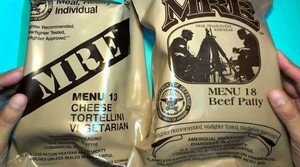 |
|
American Dry rations MRE (Meal, Ready-to-Eat) http://politikus.ru/events/ |
In mid-August, the American government allocated 60 million US dollars to buy for the Ukrainian Armed Forces dry rations, body armor, means of communication, thermal imaging, medicines, robots sappers, uniforms and the like. This equipment will be supplied to Ukraine by the end of this year. Some NATO countries have agreed to the treatment and rehabilitation of wounded Ukrainian military servicemen and pledged to deliver to Ukraine medical equipment and medicines. Taking into consideration the fact that at the territories liberated from terrorists there are left lots of unexploded mines and ammunition, NATO countries agreed to help Ukraine in carrying out “humanitarian demining”, through training Ukrainian specialists and providing special equipment.
Recently Ukraine has officially asked the United States to grant our state with the status of key ally of the United States outside the framework of NATO. However, now there is no information that this issue was discussed by P. Poroshenko and B. Obama at the NATO summit or in its sidelines. Perhaps this question will be touched upon during P. Poroshenko's visit to Washington on 18 September. It is also known that today in the United States' Congress has passed two readings and is at the stage of being adopted the draft of the United States' law № 2277 “Act for the Prevention of Aggression by Russia in 2014", where in Section 3 are defined the format and content of the provision of military assistance to Ukraine as a key ally of the United States outside NATO. However, if instead of stopping the war against Ukraine, Putin will demand from Washington to abandon the adoption of this Act, it is unlikely that B. Obama will not agree to such concessions.
|
Note: “The Major Non-NATO Ally" or MNNA — a term used to refer to the USA's allies who are not members of NATO. The introduction of such status in bilateral relations prioritizes the development of relations of the USA with these countries, including the opportunity to participate in joint defense initiatives, possibility of joint research of a military nature, participation in a number of limited counter-terrorism measures, supply of limited kinds of weapons, joint participation in space projects. MNNA status was legally defined in 1989. |
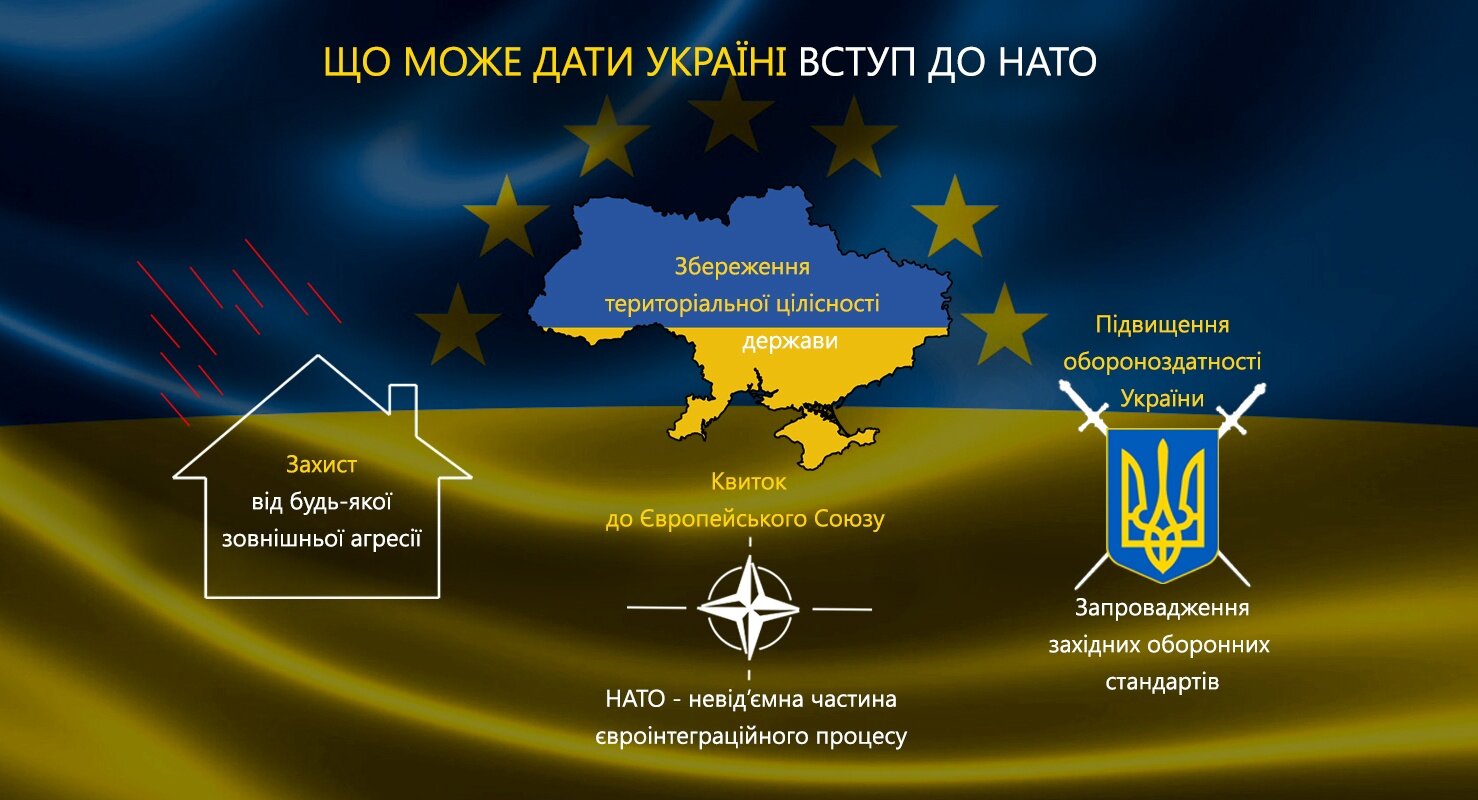
|
|
What can Ukraine get from joining NATO |
It is my deep conviction that only NATO membership can save Ukraine from Russian aggression. To do this, Verkhovna Rada (Ukraine's Parliament) should as soon as possible adopt the submitted by the Government draft law on giving up the non-aligned status of our country and resumption of the course to join NATO. Besides, as Yulia Tymoshenko proposes, 26 October, the day of parliamentary elections, we need simultaneously to hold a nationwide referendum on Ukraine's joining NATO. But before this, we need to adopt a new Electoral Code and a new edition of the law on the national referendum that meets the requirements of the Venice Commission.
According to many experts, the chances of Ukraine to join NATO today are extremely high. Firstly, Ukraine has fulfilled almost all the basic requirements of the Alliance. Secondly, the vast majority of NATO countries have nothing against Ukraine becoming their ally. Thirdly, today majority of Ukrainians want to see Ukraine in NATO as soon as possible. Thus, according to the latest sociological data of A. Razumkov's Center, in June “for NATO membership” spoke more than 40 % of Ukrainians. In 2012, the figure was just over 10%. If such a study were conducted today, for Ukraine's accession to NATO would be at least 50-60 % of the respondents.
|
Note: Requirements for entry into NATO 1. To have no territorial problems and internal conflicts.
4. Having completed the MAP, the Alliance must ratify an agreement on getting membership. |
Of the 113 points of the Wales Summit Declaration, 11 points touch upon the situation in Ukraine. In particular, the Declaration states that only NATO member-states support the sovereignty and territorial integrity of Ukraine strongly condemn Russia's illegal annexation of the Crimea and destabilization of the Eastern Ukraine. But apart from usual, though this time quite strong statements about the moral support to Kiev and the condemnation of Moscow, these paragraphs do not contain any specifics about giving Ukraine defensive weapons. Unfortunately, part of the Final Declaration concerning the Russian intervention in Ukraine, was not transformed into the NATO's West's plans to counter the aggressor and to provide our state with adequate assistance. In other words, too many words and too few concrete and decisive actions on the part of NATO. NATO, despite the international law, could crush defenseless Libya within a few days, but it cannot stop the Russian aggressor, openly violating the well-established world order.
Although NATO Secretary General Anders Fogh Rasmussen did say in his opening speech that the NATO summit in Wales “will be the most important in the history of the Alliance”, its rather modest results indicate that it is not much different from previous summits. According to the former ambassador of the USA in Ukraine John Herbst, “the NATO summit in Wales was a serious failure of vision and leadership”. He argues that Western countries react too slowly and carefully to the constant growth of Putin's aggression against Ukraine and linger with significant military supplies to Ukraine, as well as with the deployment of NATO and the USA's military bases in Eastern Europe to counter the Kremlin's aggression.
In our opinion, due to the inconsistent and indecisive policy of the leaders of leading NATO countries, their aspirations to appease Putin and to resume the pre-crisis level of relations with Russia will be vain. It is already absolutely impossible to achieve this, because Putin completely flouting common sense, has stepped over the point of no return and all sorts of red lines, and today he is a threat to the whole world, which requires a new system of common security, including through reforms of the UN, NATO and the EU.
* * *
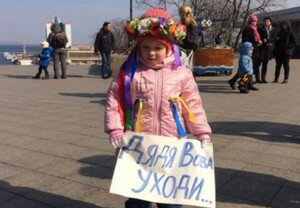 Throughout the many-century-long struggle with the Russian empire, the Ukrainian people has proved its devotion to European values. Today in the East of Ukraine new Ukrainian values are being born, worth the Europe's attention. Among them, above all, is self-sacrificing and unyielding love of Ukrainians to their Fatherland, to their family, language, land, history, traditions and culture. If Ukraine, as an exception, were have taken today into the European Union and NATO, it would be a great historic event not only for Ukraine but also for Europe and the world. It would infuse new fresh blood into the veins of an aging Europe. This would mean the revival of Europe at a new historical stage of its development. Europeans should not forget that it was the Ukraine-Rus' in the middle of the XIII century who defended Europe from the Tatar-Mongol enslavement, and in World War II, together with other peoples of the anti-Hitler coalition, Ukraine made its enormous contribution into the liberation of Europe from Nazi invaders, while losing on battlefields and in the occupation of about 10 million people. Is this not enough for (having thrown bureaucratic obstacles aside) letting Ukraine at once and immediately into NATO and the European Union?!
Throughout the many-century-long struggle with the Russian empire, the Ukrainian people has proved its devotion to European values. Today in the East of Ukraine new Ukrainian values are being born, worth the Europe's attention. Among them, above all, is self-sacrificing and unyielding love of Ukrainians to their Fatherland, to their family, language, land, history, traditions and culture. If Ukraine, as an exception, were have taken today into the European Union and NATO, it would be a great historic event not only for Ukraine but also for Europe and the world. It would infuse new fresh blood into the veins of an aging Europe. This would mean the revival of Europe at a new historical stage of its development. Europeans should not forget that it was the Ukraine-Rus' in the middle of the XIII century who defended Europe from the Tatar-Mongol enslavement, and in World War II, together with other peoples of the anti-Hitler coalition, Ukraine made its enormous contribution into the liberation of Europe from Nazi invaders, while losing on battlefields and in the occupation of about 10 million people. Is this not enough for (having thrown bureaucratic obstacles aside) letting Ukraine at once and immediately into NATO and the European Union?!
[1] О. Волович. Чи потрібне світові таке НАТО? // «Одеські вісті», № 52 (4326) - 19.05.2012
http://izvestiya.odessa.ua/index.php?go=Newspaper&in=view&id=24335
[2] О. Волович. Б. Обама тримає слово // http://www.niss.od.ua/p/305.doc

